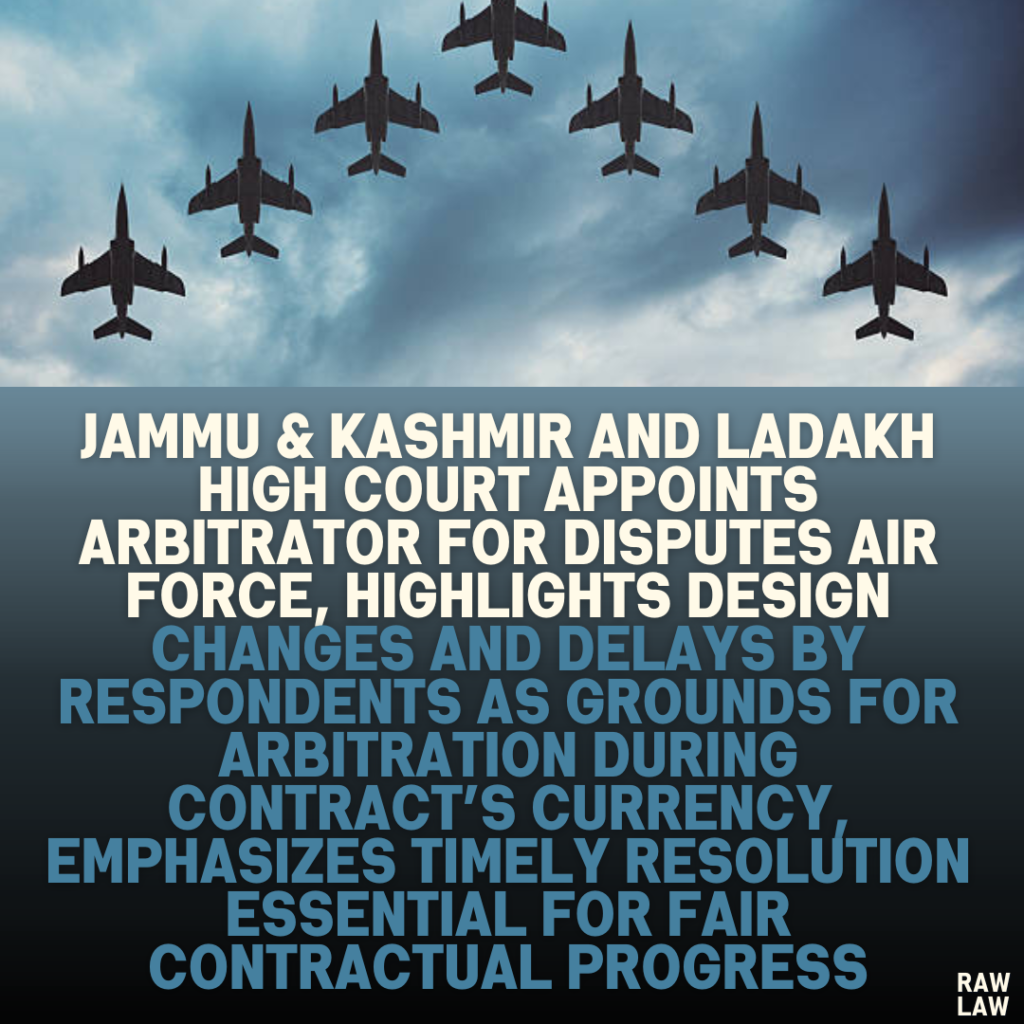Court’s Decision:
The High Court of Jammu & Kashmir and Ladakh allowed the petitioner’s request under Section 11(6) of the Arbitration and Conciliation Act, 1996. The court appointed Mr. Arvind Kumar Arora, DG (Pers), MES Department, as the Sole Arbitrator to resolve the disputes. The court directed the arbitrator to enter upon the reference and adjudicate the matter in accordance with law. The arbitrator’s fee is to be borne equally by both parties.
Facts:
- The petitioner company was awarded a contract for constructing hangars at Air Force Station Thoise for a lump sum amount of ₹71 crore under a contractual agreement with the respondents.
- The project was to commence on October 9, 2015, and be completed by October 8, 2018. However, work progressed slowly due to external factors like extreme cold weather and significant delays caused by the respondents.
- By October 2018, the petitioner had completed 70% of the work but was hindered by a sudden and unilateral decision of the respondents to change the design of the Central Heating System, opting for a new Radiant Floor Heating technology instead of the initially planned Fan Coil Units.
- This change necessitated revised designs for the flooring, which were to be provided by the respondents. However, they failed to provide these designs for over 2.5 years and ultimately removed the scope of the heating system from the contract entirely.
- During this period, the respondents issued 11 extensions for project completion, attributing delays to factors beyond the petitioner’s control. A final extension was granted up to September 13, 2024.
- Facing significant financial losses due to increased costs over nine years, the petitioner invoked Clause 70 of the Contract Agreement, requesting arbitration to resolve the disputes. The respondents did not respond, prompting the petitioner to file the present arbitration petition.
Issues:
- Can disputes under the contract be referred to arbitration during the contract’s currency?
- Should the petitioner’s invocation of Clause 70 and reliance on Clause 28.1.4(c) of the Military Engineering Services Manual be upheld?
- Was the delay in project completion attributable to the petitioner?
Petitioner’s Arguments:
- Delays and Financial Losses: The petitioner argued that the delays were entirely attributable to the respondents’ decision to change the design of the heating system and their subsequent failure to provide timely revised designs. This caused significant cost escalations over nine years.
- Clause 70 & Clause 28.1.4(c): The petitioner invoked Clause 70 of the Contract Agreement, which provides for arbitration of disputes, and relied on Clause 28.1.4(c) of the Military Engineering Services (MES) Manual, which allows arbitration during the contract’s currency in cases of substantial financial disputes.
- Undertaking on Arbitration: The petitioner undertook that no further arbitration would be sought after contract completion if the present petition was allowed.
Respondent’s Arguments:
- Premature Arbitration: The respondents contended that disputes could not be referred for arbitration until the completion or determination of the contract under Clauses 55, 56, and 57 of the Contract Agreement.
- Extensions Granted: The respondents acknowledged granting 11 extensions and indicated a willingness to grant a 12th, attributing ongoing delays to various external and contractual factors.
- Project Incompletion: The respondents argued that the contract work was incomplete and the petitioner had sought further extensions.
Analysis of the Law:
- Clause 70 of the Contract Agreement: While this clause provides for arbitration, it places conditions on when arbitration can be invoked. The respondents argued that arbitration could only occur after contract completion or determination.
- Clause 28.1.4(c) of the MES Manual: This clause allows for arbitration during the contract’s currency in cases where disputes have substantial financial implications and impact project progress. The court found this clause applicable, as the petitioner demonstrated that unresolved disputes hindered the contract’s progress.
- Arbitration Act, 1996: Section 11(6) empowers courts to appoint arbitrators when parties fail to act on arbitration agreements. The court upheld the petitioner’s right to seek arbitration under this provision.
Precedent Analysis:
The court did not explicitly rely on precedents but applied principles from arbitration law and interpreted the contractual provisions harmoniously to ensure justice. It recognized the importance of Clause 28.1.4(c) in addressing financial disputes during contract execution.
Court’s Reasoning:
- Delay Not Attributable to Petitioner: The court observed that the respondents had not disputed the petitioner’s claims of delay caused by their actions, including the change in design and failure to provide revised plans.
- Acknowledgment of Extensions: By granting 11 extensions and indicating willingness for a 12th, the respondents indirectly acknowledged their role in the delays.
- Arbitration Clause Interpretation: The court concluded that invoking arbitration during the contract’s currency was justified under Clause 28.1.4(c), given the substantial financial impact on the petitioner.
Conclusion:
The High Court allowed the arbitration petition, emphasizing the need for timely resolution of disputes to prevent further financial losses and project delays. Mr. Arvind Kumar Arora was appointed as the Sole Arbitrator, with both parties directed to share the arbitrator’s fees equally.
Implications:
This judgment reinforces the principle that arbitration can be initiated during ongoing contracts to address significant disputes impacting project progress. It highlights the importance of harmonizing contractual provisions and manual guidelines to ensure fair treatment of contractors in government projects.
